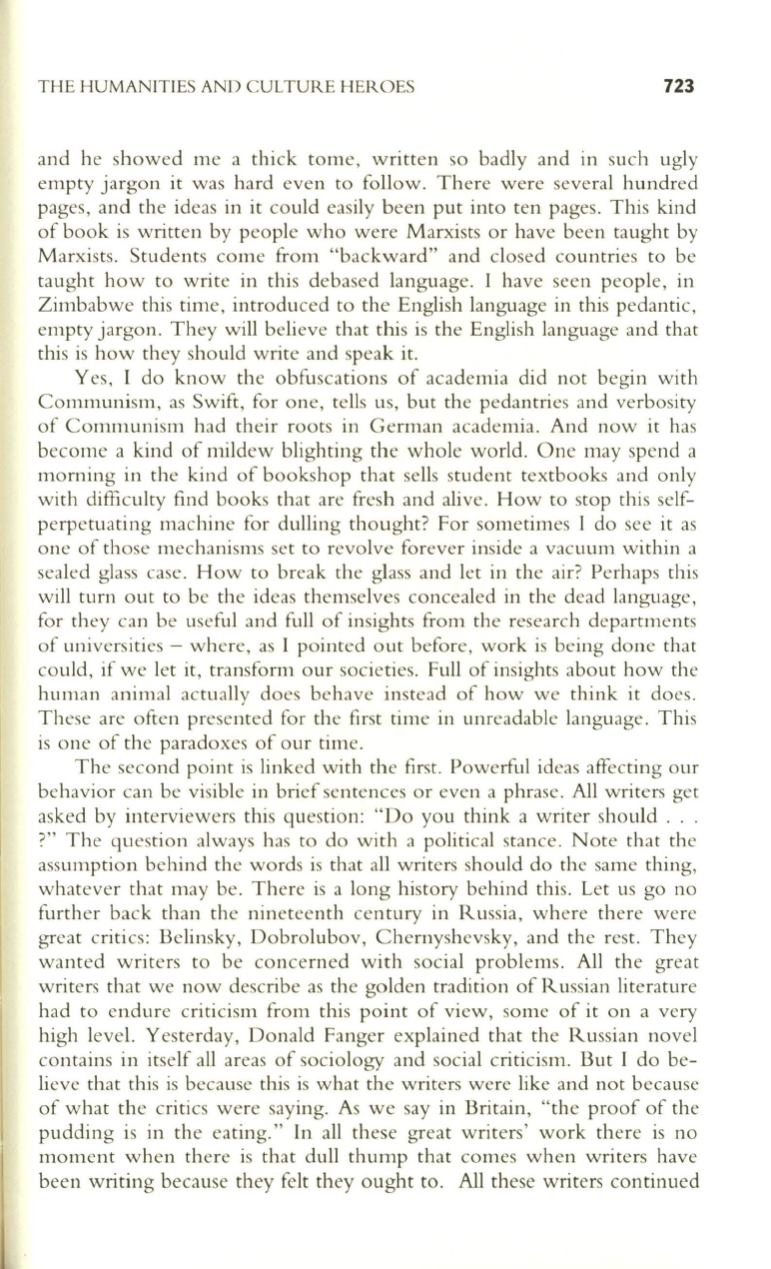
THE HUMANITIES AND CULTURE HEROES
723
and he showed me a thick tome, written so badly and in such ugly
empty jargon it was hard even to follow. There were several hundred
pages, and the ideas in it could easily been put into ten pages. This kind
of book is written by people who were Marxists or have been taught by
Marxists. Students come from "backward" and closed countries to be
taught how to write in this debased language. I have seen people, in
Zimbabwe this time, introduced to the English language in this pedantic,
empty jargon. They will believe that this is the English language and that
this is how they should write and speak it.
Yes, I do know the obfuscations of academia did not begin with
Communism, as Swift, for one, tells us, but the pedantries and verbosity
of Communism had their roots in German academia. And now it has
become a kind of mildew blighting the whole world. One may spend a
morning in the kind of bookshop that sells student textbooks and only
with difficulty find books that are fresh and alive. How to stop this self–
perpetuating machine for dulling thought? For sometimes I do see it as
one of those mechanisms set to revolve forever inside a vacuum within a
sealed glass case. How to break the glass and let in the air? Perhaps this
will turn out to be the ideas themselves concealed in the dead language,
for they can be useful and full of insights from the research departments
of universities - where, as I pointed out before, work is being done that
could, if we let it, transform our societies. Full of insights about how the
human animal actually does behave instead of how we think it does.
These are often presented for the first time in unreadable language. This
is one of the paradoxes of our time.
The second point is linked with the first. Powerful ideas affecting our
behavior can be visible in brief sentences or even a phrase. All writers get
asked by interviewers this question: "Do you think a writer should ...
?" The question always has to do with a political stance. Note that the
assumption behind the words is that all writers should do the same thing,
whatever that may be. There is a long history behind this. Let us go no
further back than the nineteenth century in Russia, where there were
great critics: Belinsky, Dobrolubov, Chernyshevsky, and the rest. They
wanted writers to be concerned with social problems. All the great
writers that we now describe as the golden tradition of Russian literature
had to endure criticism from this point of view, some of it on a very
high level. Yesterday, Donald Fanger explained that the Russian novel
contains in itself all areas of sociology and social criticism. But I do be–
lieve that this is because this is what the writers were like and not because
of what the critics were saying. As we say in Britain, "the proof of the
pudding is in the eating." In all these great writers' work there is no
moment when there is that dull thump that comes when writers have
been writing because they felt they ought to. All these writers continued


